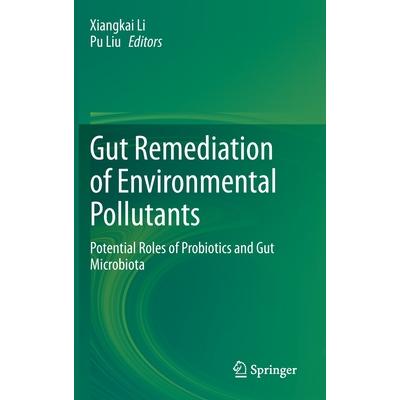Gut Remediation of Environmental PollutantsPotential Roles of Probiotics and Gut Microbiot
Gut Remediation of Environmental PollutantsPotential Roles of Probioti
活動訊息
內容簡介
Chapter 1: Gut microbiotaSummary: The gut is a huge complex ecosystem where microbiota, nutrients, and host cells interact extensively, a process crucial for the gut homeostasis and host health. The gut microbiota has many functions including metabolic, barrier effect, and trophic functions. Hence, many diseases have been associated to impairment of the gut microbiota. This part provides in depth view of the close relationship between gut microbiota, health and disease.1.1Gut microbiota1.2Gut microbiota balance and health1.3Gut microbiota dysbiosis and diseaseChapter 2: Probiotics and gut microbiotaSummary: Probiotics, "live micro-organisms", when consumed in adequate amounts, positively modulate the gut microbiota to prevent or treat some
diseases. This part gives the interaction between probiotics and gut microbiota contributing to host health.2.1Probiotics2.2Probiotics and gut microbiota2.3 Probiotics and healthChapter 3: Probiotics, gut microbiota and heavy metalsSummary: The accumulation of heavy metals disrupts the structure of gut microbiota, causing damage to organs such as liver and kidney. Probiotics effectively protect against heavy metals toxicity by facilitating heavy metals excretion and mediating gut microbiota.3.1Common heavy metals (Cr, Cd, Hg, Pb, As, Cu, MeHg)3.2Other representative metals (Al, Zn, Ni)Chapter 4: Probiotics, gut microbiota and pesticidesSummary: Various pesticides lead to adverse effects on human health, such as oxidative stress and metabolism disorder of the gut microbiota. Probiotics protect against pesticides-induced oxidative stress and downstream cellular damage by enzymatically degrading pesticides, reducing the absorption of pesticides and stimulating host's own immunity.4.1Organophosphorus pesticides (chlorpyrifos, malathion, diazinon, glyphosate)4.2Organochlorine pesticides (pentachlorophenol, permethrin)4.3Other pesticides (imazalil, carbendazim)Chapter 5: Probiotics, gut microbiota and antibioticsSummary: Antibiotics kill a large number of gut microbiota without prejudice, and improve the resistance of pathogenic bacteria such as Clostridium difficile. Antibiotic associated diarrhoea and Clostridium difficile infection can be common following antibiotics treatment. Probiotics have been widely reported to reduce the risks of antibiotics-induced side effects.5.1Antibiotics and gut microbiota5.2Effect of probiotics on antibiotics associated diarrhoea5.3Effect of probiotics on Clostridium difficile infection5.4Potential protective mechanism of probioticsChapter 6: Probiotics, gut microbiota and other persistent organic pollutantsSummary: Polycyclic aromatic hydrocarbons come from grilled or smoked meat and fish that is carcinogenic. The essential oil analogue has significant antimicrobial activity against gut microbiota, which causes abnormal metabolism of gut microbiota. However, probiotics can be used as an alternative method against mutagenesis caused by some persistent organic pollutants. Many food additives can be replaced by lactic acid bacteria.
6.1Polycyclic aromatic hydrocarbons (anthracene, naphthalene, phenanthrene, pyrene, benzo(a)pyrene)6.2 Food additives (sweeteners, emulsifiers, flavoring agents, coloring agents)Chapter 7: Gut microbiota, probiotics and biological contaminantsSummary: Some pathogenic organisms can invade the gastrointestinal tract, compete for nutrients and release toxins. Meanwhile, they can inhibit the normal growth and metabolism of the host's native microbiota. Probiotic, such as Lactobacillus rhamnosus, has been reported to detoxify aflatoxin through modulate gut microbiota, fecal excretion in animals.
diseases. This part gives the interaction between probiotics and gut microbiota contributing to host health.2.1Probiotics2.2Probiotics and gut microbiota2.3 Probiotics and healthChapter 3: Probiotics, gut microbiota and heavy metalsSummary: The accumulation of heavy metals disrupts the structure of gut microbiota, causing damage to organs such as liver and kidney. Probiotics effectively protect against heavy metals toxicity by facilitating heavy metals excretion and mediating gut microbiota.3.1Common heavy metals (Cr, Cd, Hg, Pb, As, Cu, MeHg)3.2Other representative metals (Al, Zn, Ni)Chapter 4: Probiotics, gut microbiota and pesticidesSummary: Various pesticides lead to adverse effects on human health, such as oxidative stress and metabolism disorder of the gut microbiota. Probiotics protect against pesticides-induced oxidative stress and downstream cellular damage by enzymatically degrading pesticides, reducing the absorption of pesticides and stimulating host's own immunity.4.1Organophosphorus pesticides (chlorpyrifos, malathion, diazinon, glyphosate)4.2Organochlorine pesticides (pentachlorophenol, permethrin)4.3Other pesticides (imazalil, carbendazim)Chapter 5: Probiotics, gut microbiota and antibioticsSummary: Antibiotics kill a large number of gut microbiota without prejudice, and improve the resistance of pathogenic bacteria such as Clostridium difficile. Antibiotic associated diarrhoea and Clostridium difficile infection can be common following antibiotics treatment. Probiotics have been widely reported to reduce the risks of antibiotics-induced side effects.5.1Antibiotics and gut microbiota5.2Effect of probiotics on antibiotics associated diarrhoea5.3Effect of probiotics on Clostridium difficile infection5.4Potential protective mechanism of probioticsChapter 6: Probiotics, gut microbiota and other persistent organic pollutantsSummary: Polycyclic aromatic hydrocarbons come from grilled or smoked meat and fish that is carcinogenic. The essential oil analogue has significant antimicrobial activity against gut microbiota, which causes abnormal metabolism of gut microbiota. However, probiotics can be used as an alternative method against mutagenesis caused by some persistent organic pollutants. Many food additives can be replaced by lactic acid bacteria.
6.1Polycyclic aromatic hydrocarbons (anthracene, naphthalene, phenanthrene, pyrene, benzo(a)pyrene)6.2 Food additives (sweeteners, emulsifiers, flavoring agents, coloring agents)Chapter 7: Gut microbiota, probiotics and biological contaminantsSummary: Some pathogenic organisms can invade the gastrointestinal tract, compete for nutrients and release toxins. Meanwhile, they can inhibit the normal growth and metabolism of the host's native microbiota. Probiotic, such as Lactobacillus rhamnosus, has been reported to detoxify aflatoxin through modulate gut microbiota, fecal excretion in animals.
配送方式
-
台灣
- 國內宅配:本島、離島
-
到店取貨:
-
海外
- 國際快遞:全球
訂購/退換貨須知
加入金石堂 LINE 官方帳號『完成綁定』,隨時掌握出貨動態:
商品運送說明:
- 本公司所提供的產品配送區域範圍目前僅限台灣本島。注意!收件地址請勿為郵政信箱。
- 商品將由廠商透過貨運或是郵局寄送。消費者訂購之商品若無法送達,經電話或 E-mail無法聯繫逾三天者,本公司將取消該筆訂單,並且全額退款。
- 當廠商出貨後,您會收到E-mail出貨通知,您也可透過【訂單查詢】確認出貨情況。
- 產品顏色可能會因網頁呈現與拍攝關係產生色差,圖片僅供參考,商品依實際供貨樣式為準。
- 如果是大型商品(如:傢俱、床墊、家電、運動器材等)及需安裝商品,請依商品頁面說明為主。訂單完成收款確認後,出貨廠商將會和您聯繫確認相關配送等細節。
- 偏遠地區、樓層費及其它加價費用,皆由廠商於約定配送時一併告知,廠商將保留出貨與否的權利。
提醒您!!
金石堂及銀行均不會請您操作ATM! 如接獲電話要求您前往ATM提款機,請不要聽從指示,以免受騙上當!
退換貨須知:
**提醒您,鑑賞期不等於試用期,退回商品須為全新狀態**
-
依據「消費者保護法」第19條及行政院消費者保護處公告之「通訊交易解除權合理例外情事適用準則」,以下商品購買後,除商品本身有瑕疵外,將不提供7天的猶豫期:
- 易於腐敗、保存期限較短或解約時即將逾期。(如:生鮮食品)
- 依消費者要求所為之客製化給付。(客製化商品)
- 報紙、期刊或雜誌。(含MOOK、外文雜誌)
- 經消費者拆封之影音商品或電腦軟體。
- 非以有形媒介提供之數位內容或一經提供即為完成之線上服務,經消費者事先同意始提供。(如:電子書、電子雜誌、下載版軟體、虛擬商品…等)
- 已拆封之個人衛生用品。(如:內衣褲、刮鬍刀、除毛刀…等)
- 若非上列種類商品,均享有到貨7天的猶豫期(含例假日)。
- 辦理退換貨時,商品(組合商品恕無法接受單獨退貨)必須是您收到商品時的原始狀態(包含商品本體、配件、贈品、保證書、所有附隨資料文件及原廠內外包裝…等),請勿直接使用原廠包裝寄送,或於原廠包裝上黏貼紙張或書寫文字。
- 退回商品若無法回復原狀,將請您負擔回復原狀所需費用,嚴重時將影響您的退貨權益。










商品評價